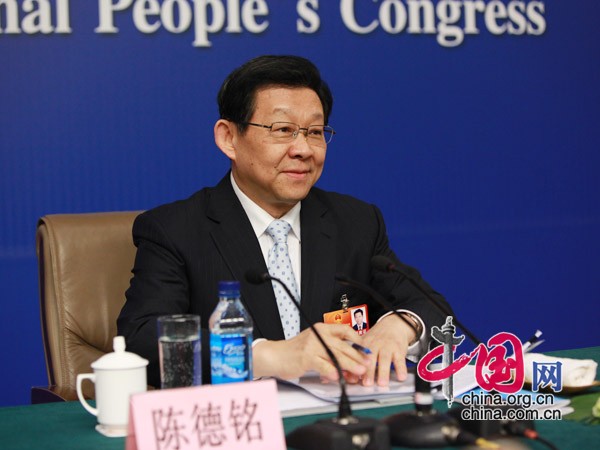U.S. anti-subsidy duties not within WTO rules
 0 Comment(s)
0 Comment(s) Print
Print E-mail Xinhua, March 7, 2012
E-mail Xinhua, March 7, 2012
 |
|
Chen Deming at the press conference. |
The passage of a bill by the U.S. Senate to empower the Department of Commerce to impose countervailing duties on Chinese imports is not in line with international rules and must be corrected, Minister of Commerce Chen Deming said at a Wednesday press conference.
The minister's remark came after the U.S. Senate on Monday passed a bill to allow the Department of Commerce to impose countervailing duties on imports from China and Vietnam.
Chen reiterated that China will only follow the rules of those international organizations it has joined. In terms of economics and trade, for example, China has followed the rules of the WTO since acceding to the WTO 11 years ago, Chen said.
"But we don't have the obligation to abide by any domestic laws and regulations that are not in line with the rules of international organizations," Chen said.
WTO rules divide government subsidies into prohibitive subsidies and actionable subsidies, with most WTO members handing down subsidies of different types, Chen said.
Since the onset of the global financial crisis, many countries, particularly the United States, have subsidized automobile companies in the form of bailouts, he said.
China did not come up with new subsidies during the global financial crisis in response to an appeal by the Group of 20, nor did China launch massive countervailing measures against such subsidies by other countries, Chen said.
The U.S. bill was a response to a U.S. Federal Court ruling on Dec. 19, 2011, stating that the U.S. Commerce Department does not have the legal authority to impose countervailing duties on goods from non-market economy countries.
The court explained that government payments cannot be characterized as "subsidies" in an non-market economy context, saying the Obama administration lacked legal ground to impose a three-year tariff on imports of low-grade Chinese tires in September 2009.
Both the U.S. House and the Senate acted quickly after the hearing to introduce a bill to remedy the Tariff Act of 1930 and overturn the Federal Court's decision.
Chen said he "can't understand" why the U.S. has imposed high tariffs on imports from China in the form of 31 anti-dumping and anti-subsidy measures and failed to correct its own mistakes after a court ruling.
The minister said China hopes to discuss the issue with countries that have accused China of giving out prohibitive subsidies.
"Let me be clear: there are no prohibitive subsidies handed down by the Chinese central government," Chen said.





